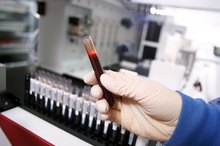Spleen Pain After Eating
The spleen is a small, fist-sized organ located below your left rib cage, and is a significant part of your body’s immune system. It helps fight infection by producing white blood cells called lymphocytes as a defense against invading pathogens. It also stores platelets and blood, and filters out and destroys damaged or old blood cells. You can live without your spleen, but your immunity to serious or life-threatening diseases will be much lower. The spleen's infection-fighting functions are severely compromised when it is infected and enlarged.
If you are experiencing serious medical symptoms, seek emergency treatment immediately.
Symptoms
An enlarged spleen, or splenomegaly, presents no symptoms in most people. However, some people may experience pain in the upper left side of the abdomen after eating. They may also feel full after eating a small amount of food. Other symptoms include anemia, fatigue and easy bleeding. Pain that is severe or gets worse when you take a deep breath requires immediate medical attention.
- An enlarged spleen, or splenomegaly, presents no symptoms in most people.
- However, some people may experience pain in the upper left side of the abdomen after eating.
Causes
High Bilirubin Levels in Adults
Learn More
Infections such as hepatitis, syphilis, tuberculosis, malaria, endocarditis or mononucleosis can cause an enlarged spleen. Blood cancers such as leukemia, myelofibrosis, and Hodgkin lymphoma can also cause inflammation of the spleen. Sarcoidosis, systemic lupus, cirrhosis, cysts in the spleen or blood clots in the vein that connects the spleen to the liver can also enlarge the spleen.
- Infections such as hepatitis, syphilis, tuberculosis, malaria, endocarditis or mononucleosis can cause an enlarged spleen.
- Sarcoidosis, systemic lupus, cirrhosis, cysts in the spleen or blood clots in the vein that connects the spleen to the liver can also enlarge the spleen.
Complications
An enlarged spleen stores and traps an excessive amount of platelets and blood cells, a condition known as hypersplenism. The larger the spleen becomes, the more blood cells and platelets are trapped and stored. Eventually, normal red blood cells also become trapped as the spleen continues to increase in size, leading to anemia, increased infection and impaired spleen function. An enlarged spleen can outgrow its own blood supply, and parts of the organ may not get enough blood and become damaged. The damaged areas either bleed or die.
- An enlarged spleen stores and traps an excessive amount of platelets and blood cells, a condition known as hypersplenism.
- Eventually, normal red blood cells also become trapped as the spleen continues to increase in size, leading to anemia, increased infection and impaired spleen function.
Diagnosis
Causes of High MPV Blood
Learn More
Because it does not always present any symptoms, an enlarged spleen is usually detected during a routine physical exam. In a very slender person, however, a normal-sized spleen may also be felt easily during an exam. Blood tests and an ultrasound or CT scan can confirm the diagnosis. An MRI, or magnetic resonance image, may be needed to trace the blood flow through the spleen.
- Because it does not always present any symptoms, an enlarged spleen is usually detected during a routine physical exam.
- In a very slender person, however, a normal-sized spleen may also be felt easily during an exam.
Treatment
Treating an enlarged spleen requires diagnosing and treating the underlying cause 1. Treatment options can include antibiotics to treat infection, or chemo or radiation therapy if the cause is leukemia or Hodgkin’s disease. Depending on the severity of the condition, a splenectomy, or removal of the spleen, may be necessary. Radiation therapy to shrink the spleen is a nonsurgical alternative that may be considered.
- Treating an enlarged spleen requires diagnosing and treating the underlying cause 1.
- Treatment options can include antibiotics to treat infection, or chemo or radiation therapy if the cause is leukemia or Hodgkin’s disease.
Related Articles
References
Writer Bio
Connie Peete is a writer specializing in personal finance and health topics. She holds an associate's degree in secretarial science and information processing from the Bryant & Stratton Business Institute.








